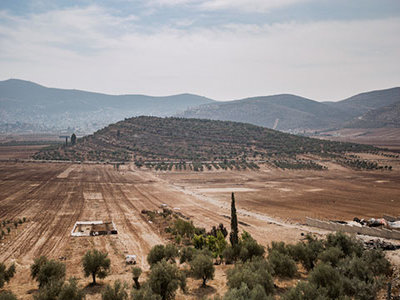
By Palestine Chronicle Staff
B’Tselem – The Israeli Information Centre for Human Rights in the Occupied Territories has published a report which detailed what the organization described as Israel’s practice of taking over rural Palestinian lands in the West Bank, by adopting a policy of fragmenting Palestinian communities and cities.
The report tells the history of the process of fragmentation imposed on Palestinians in the West Bank, by highlighting the case of three Palestinian villages in the Nablus District: Azmut, Deir al-Hatab and Salem.
The reported noted, “What these communities have experienced since 1980, when Israel established the Elon Moreh settlement nearby, is but one illustration of broader developments taking place throughout the West Bank. Their story is similar to that of hundreds of Palestinian communities on whose lands Israeli settlements were established.”
Expel and Exploit: New report from @btselem surveys the #Israeli practice of taking over rural #Palestinian land https://t.co/55Y4RCBSYD pic.twitter.com/I7cyLcbtBc
— Al-Shabaka الشبكة (@AlShabaka) December 19, 2016
B’Tselem revealed that since 1967, the Israeli occupation authorities have employed various measures to disconnect villagers from their lands, and hand it over to Israeli settlers. Israel established the Elon Moreh settlement on governmental land, which was under the rule of Jordan until 1967 and later declared a nature reserve on some of the remaining land west of the settlement. “This resulted in the creation of an area, far exceeding that of the settlement’s jurisdiction, where Palestinians must receive Israeli permission for carrying out any development, construction, new cultivation, or pasturing livestock. In 1987, 170 hectares of the nature reserve were declared “state land”, and an illegal settlement outpost erected there in 1998,” the report noted.
B’Tselem adds that the next phase of fragmentation of these three Palestinian villages took place after 1995, following the Oslo Accords, where the villages’ lands were divided into areas B and C. “Ever since, use of the lands designated as Area C for practically any purpose – especially for building and development – is subject to Israeli approval, which is almost always denied to villagers. In so doing, Israel laid the administrative groundwork for separating the built-up areas of the villages from most of their farmland and pastures,” the organization continued.
Israel has later built a road connecting the settlement of Elon Moreh with the settlement of Itimar, which meant that Israeli settlers no longer needed to cross through the built-up areas of the three villages, and which also meant disconnecting Palestinian villagers from their farming land. The road was shut down in the face of Palestinians following the outbreak of the second Palestinian uprising in 2000.
Expel and Exploit: The Israeli Practice of Taking over Rural Palestinian Land, B’Tselem – PNN https://t.co/Lecv31TDfn @pnnenglish #Palestine pic.twitter.com/Jj7PUKmqWU
— al whit (@soitiz) December 8, 2016
The report concluded,
“The forced separation of the Palestinian villagers from their farmland, pastureland and natural water resources severely infringed upon their rights, devastated the local economy, and propelled them into poverty and dependence on external bodies. Villagers were left in a state of insecurity on multiple levels: financial, food and social insecurity.”
(PalestineChroncile.com)




